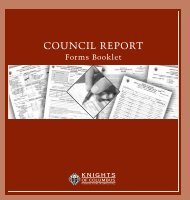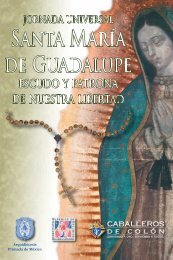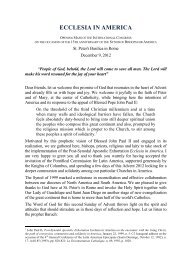CATHOLIC WORD BOOK - Knights of Columbus, Supreme Council
CATHOLIC WORD BOOK - Knights of Columbus, Supreme Council
CATHOLIC WORD BOOK - Knights of Columbus, Supreme Council
Create successful ePaper yourself
Turn your PDF publications into a flip-book with our unique Google optimized e-Paper software.
Contraception: Anything done by positive<br />
interference to prevent sexual intercourse<br />
from resulting in conception. Direct<br />
contraception is against the order <strong>of</strong><br />
nature. Indirect contraception — as a<br />
secondary effect <strong>of</strong> medical treatment or<br />
other action having a necessary, good, non<br />
contraceptive purpose — is permissible<br />
under the principle <strong>of</strong> the double effect.<br />
The practice <strong>of</strong> periodic continence is not<br />
contraception because it does not involve<br />
positive interference with the order <strong>of</strong><br />
nature. (See Humanae Vitae, other entries.)<br />
Contrition: Sorrow for sin coupled with a<br />
purpose <strong>of</strong> amendment. Contrition arising<br />
from a supernatural motive is necessary for<br />
the forgiveness <strong>of</strong> sin. (1) Perfect contrition<br />
is total sorrow for and renunciation <strong>of</strong><br />
attachment to sin, arising from the motive<br />
<strong>of</strong> pure love <strong>of</strong> God. Perfect contrition,<br />
which implies the intention <strong>of</strong> doing all<br />
God wants done for the forgiveness <strong>of</strong> sin<br />
(including confession in a reasonable<br />
period <strong>of</strong> time), is sufficient for the<br />
forgiveness <strong>of</strong> serious sin and the remission<br />
<strong>of</strong> all temporal punishment due for sin.<br />
(The intention to receive the sacrament <strong>of</strong><br />
penance is implicit — even if unrealized,<br />
as in the case <strong>of</strong> some persons — in perfect<br />
contrition.) (2) Imperfect contrition or<br />
attrition is sorrow arising from a quasi<br />
selfish supernatural motive; e.g., the fear <strong>of</strong><br />
losing heaven, suffering the pains <strong>of</strong> hell,<br />
etc. Imperfect contrition is sufficient for<br />
the forgiveness <strong>of</strong> serious sin when joined<br />
with absolution in confession, and<br />
sufficient for the forgiveness <strong>of</strong> venial sin<br />
even outside <strong>of</strong> confession.<br />
Contumely: Personal insult, reviling a<br />
person in his presence by accusation <strong>of</strong><br />
moral faults, by refusal <strong>of</strong> recognition or<br />
-22-<br />
due respect; a violation <strong>of</strong> obligations <strong>of</strong><br />
justice and charity.<br />
Conversion: In a general sense, the turning<br />
away from someone or something and the<br />
moving toward another person or thing. In<br />
Christian belief, conversion is the embrace<br />
<strong>of</strong> Jesus Christ and a rejection <strong>of</strong> all that<br />
keeps one from God.<br />
Corpus Iuris Canonici: See Canon Law.<br />
<strong>Council</strong>: A formal meeting <strong>of</strong> Church<br />
leaders, summoned by a bishop or<br />
appropriate Church leader, with the<br />
general purpose <strong>of</strong> assisting the life <strong>of</strong> the<br />
Church through deliberations, decrees,<br />
and promulgations. Different councils<br />
include: diocesan councils (synod), a<br />
gathering <strong>of</strong> the <strong>of</strong>ficials <strong>of</strong> an individual<br />
diocese; provincial councils, the meeting<br />
<strong>of</strong> the bishops <strong>of</strong> a province; plenary<br />
councils, the assembly <strong>of</strong> the bishops <strong>of</strong> a<br />
country; and ecumenical councils, a<br />
gathering <strong>of</strong> all the bishops in the world<br />
under the authority <strong>of</strong> the Bishop <strong>of</strong><br />
Rome.<br />
Counsels, Evangelical: Gospel counsels <strong>of</strong><br />
perfection, especially voluntary poverty,<br />
perfect chastity and obedience, which<br />
were recommended by Christ to those<br />
who would devote themselves exclusively<br />
and completely to the immediate service<br />
<strong>of</strong> God. Religious (members <strong>of</strong> institutes<br />
<strong>of</strong> consecrated life) bind themselves by<br />
public vows to observe these counsels in a<br />
life <strong>of</strong> total consecration to God and<br />
service to people through various kinds <strong>of</strong><br />
apostolic works.<br />
Counter-Reformation: The period <strong>of</strong><br />
approximately 100 years following the

















